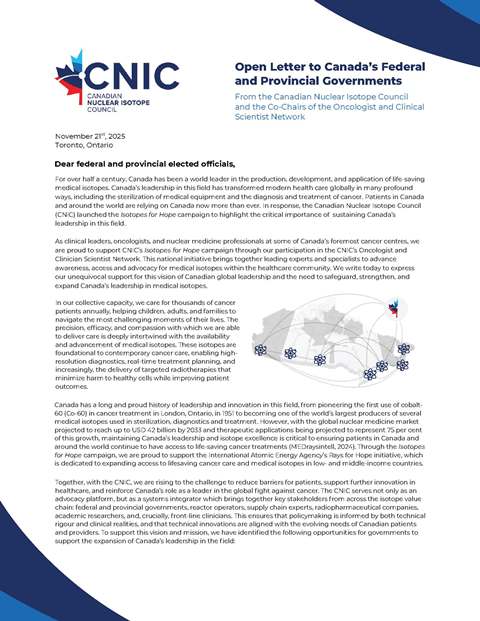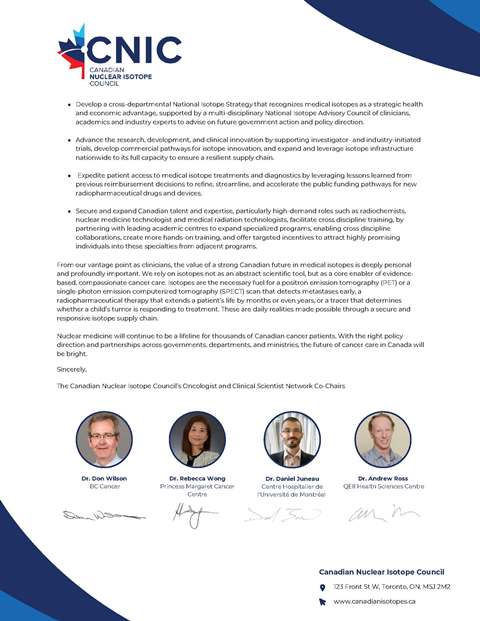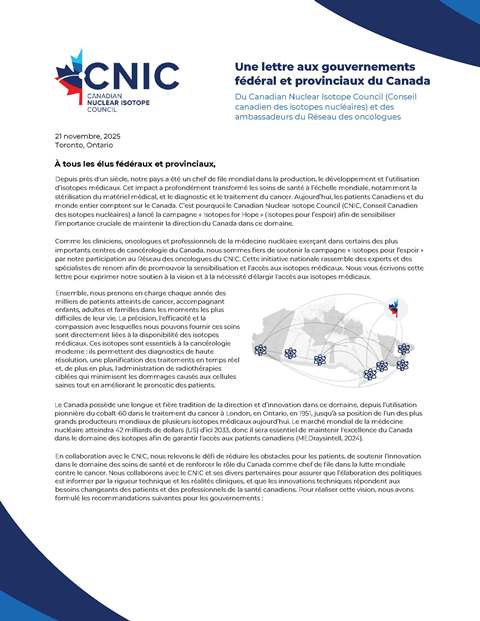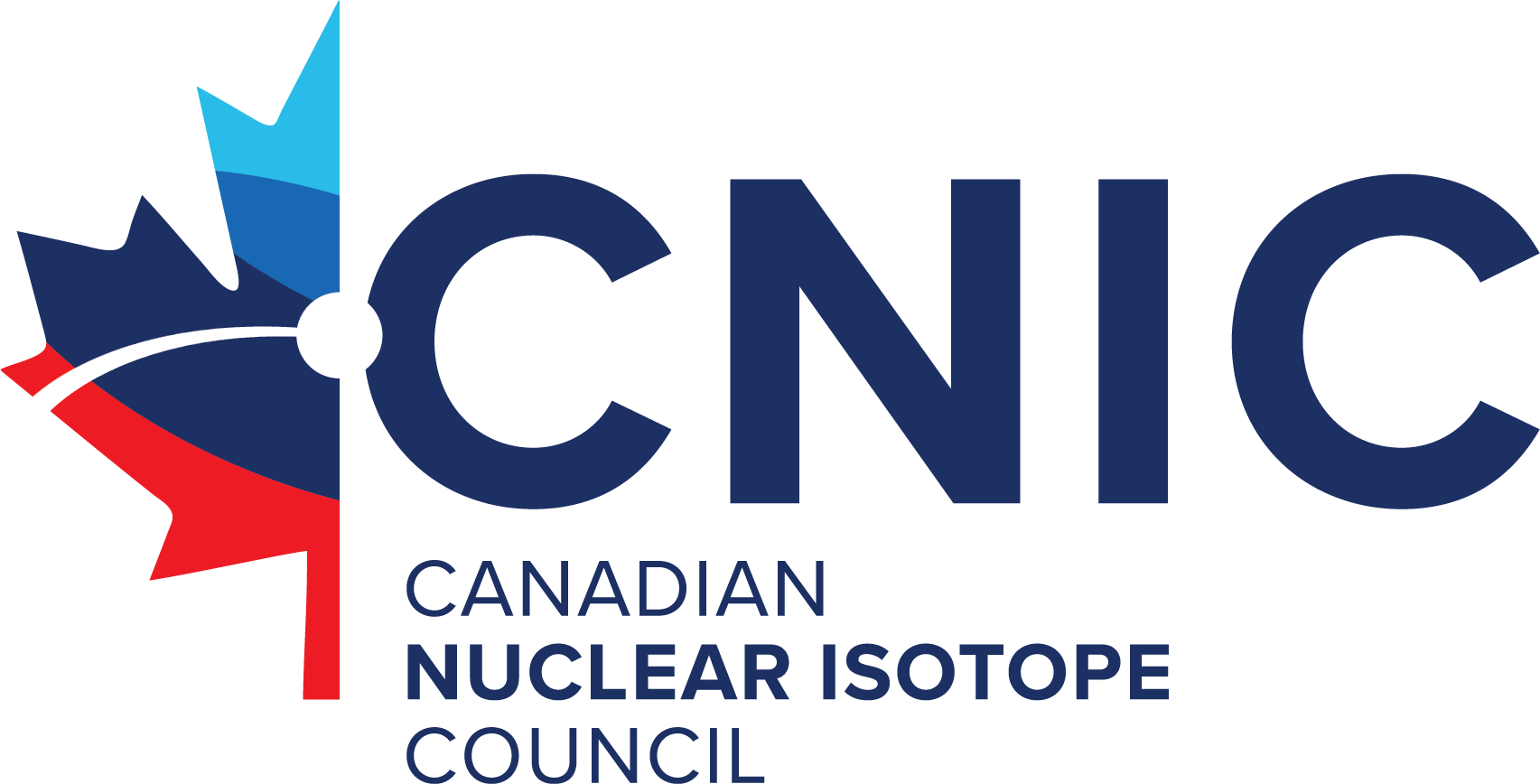
In 2025, in support of the Isotopes for Hope campaign, the CNIC launched its Oncologist & Clinical Scientist Network, a national initiative bringing together leading experts and specialists in the healthcare community to advance awareness of and access to life-changing medical isotopes and radiopharmaceuticals. This expert Network, led by four Co-Chairs at leading cancer centres across the country, will work alongside the CNIC and its partners, deepening cross-sectoral advocacy.
The first step in this advocacy was the letter below, sent to all federal and provincial elected officials across Canada, encouraging governments at all levels to support Canadian expansion in the isotope field and expand patient access.
We invite healthcare professionals from across Canada to join this Network in support of the Isotopes for Hope campaign by adding their names to the letter.
Please consider adding your name by completing the form.


Open Letter to Canada’s Federal and Provincial Governments
From the Canadian Nuclear Isotope Council and the Ambassadors of the Oncologist and Clinical Scientist Network
November 21, 2025
Toronto, Ontario
Dear federal and provincial elected officials,
For over half a century, Canada has been a world leader in the production, development, and application of life-saving medical isotopes. Canada’s leadership in this field has transformed modern health care globally in many profound ways, including the sterilization of medical equipment and the diagnosis and treatment of cancer. Patients in Canada and around the world are relying on Canada now more than ever. In response, the Canadian Nuclear Isotope Council (CNIC) launched the Isotopes for Hope campaign to highlight the critical importance of sustaining Canada’s leadership in this field.
As clinical leaders, oncologists, and nuclear medicine professionals at some of Canada’s foremost cancer centres, we are proud to support CNIC’s Isotopes for Hope campaign through our participation in the CNIC’s Oncologist and Clinician Scientist Network. This national initiative brings together leading experts and specialists to advance awareness, access and advocacy for medical isotopes within the healthcare community. We write today to express our unequivocal support for this vision of Canadian global leadership and the need to safeguard, strengthen, and expand Canada’s leadership in medical isotopes.
In our collective capacity, we care for thousands of cancer patients annually, helping children, adults, and families to navigate the most challenging moments of their lives. The precision, efficacy, and compassion with which we are able to deliver care is deeply intertwined with the availability and advancement of medical isotopes. These isotopes are foundational to contemporary cancer care, enabling high-resolution diagnostics, real-time treatment planning, and increasingly, the delivery of targeted radiotherapies that minimize harm to healthy cells while improving patient outcomes.
Canada has a long and proud history of leadership and innovation in this field, from pioneering the first use of cobalt-60 (Co-60) in cancer treatment in London, Ontario, in 1951 to becoming one of the world’s largest producers of several medical isotopes used in sterilization, diagnostics and treatment. However, with the global nuclear medicine market projected to reach up to USD 42 billion by 2033 and therapeutic applications being projected to represent 75 per cent of this growth, maintaining Canada’s leadership and isotope excellence is critical to ensuring patients in Canada and around the world continue to have access to life-saving cancer treatments (MEDraysintell, 2024). Through the Isotopes for Hope campaign, we are proud to support the International Atomic Energy Agency’s Rays for Hope initiative, which is dedicated to expanding access to lifesaving cancer care and medical isotopes in low- and middle-income countries.
Together, with the CNIC, we are rising to the challenge to reduce barriers for patients, support further innovation in healthcare, and reinforce Canada’s role as a leader in the global fight against cancer. The CNIC serves not only as an advocacy platform, but as a systems integrator which brings together key stakeholders from across the isotope value chain: federal and provincial governments, reactor operators, supply chain experts, radiopharmaceutical companies, academic researchers, and, crucially, front-line clinicians. This ensures that policymaking is informed by both technical rigour and clinical realities, and that technical innovations are aligned with the evolving needs of Canadian patients and providers. To support this vision and mission, we have identified the following opportunities for governments to support the expansion of Canada’s leadership in the field:
- Develop a cross-departmental National Isotope Strategy that recognizes medical isotopes as a strategic health and economic advantage, supported by a multi-disciplinary National Isotope Advisory Council of clinicians, academics and industry experts to advise on future government action and policy direction.
- Advance the research, development, and clinical innovation by supporting investigator- and industry-initiated trials, develop commercial pathways for isotope innovation, and expand and leverage isotope infrastructure nationwide to its full capacity to ensure a resilient supply chain.
- Expedite patient access to medical isotope treatments and diagnostics by leveraging lessons learned from previous reimbursement decisions to refine, streamline, and accelerate the public funding pathways for new radiopharmaceutical drugs and devices.
- Secure and expand Canadian talent and expertise, particularly high-demand roles such as radiochemists, nuclear medicine technologist and medical radiation technologists, facilitate cross discipline training, by partnering with leading academic centres to expand specialized programs, enabling cross discipline collaborations, create more hands-on training, and offer targeted incentives to attract highly promising individuals into these specialties from adjacent programs.
From our vantage point as clinicians, the value of a strong Canadian future in medical isotopes is deeply personal and profoundly important. We rely on isotopes not as an abstract scientific tool, but as a core enabler of evidence-based, compassionate cancer care. Isotopes are the necessary fuel for a positron emission tomography (PET) or a single-photon emission computerized tomography (SPECT) scan that detects metastases early, a radiopharmaceutical therapy that extends a patient’s life by months or even years, or a tracer that determines whether a child’s tumor is responding to treatment. These are daily realities made possible through a secure and responsive isotope supply chain.
Nuclear medicine will continue to be a lifeline for thousands of Canadian cancer patients. With the right policy direction and partnerships across governments, departments, and ministries, the future of cancer care in Canada will be bright.
Sincerely,
The Canadian Nuclear Isotope Council’s Oncologist and Clinical Scientist Network Co-Chairs
Dr. Don Wilson
BC Cancer
Dr. Rebecca Wong
Princess Margaret Cancer Centre
Dr. Daniel Juneau
Centre Hospitalier de l’Université de Montréal
Dr. Andrew Ross
QEII Health Sciences Centre


Une lettre aux gouvernements fédéral et provinciaux du Canada
Du Canadian Nuclear Isotope Council (Conseil canadien des isotopes nucléaires) et des ambassadeurs du Réseau des oncologues
21 novembre, 2025
Toronto, Ontario
À tous les élus fédéraux et provinciaux,
Depuis près d’un siècle, notre pays a été un chef de file mondial dans la production, le développement et l’utilisation d’isotopes médicaux. Cet impact a profondément transformé les soins de santé à l’échelle mondiale, notamment la
stérilisation du matériel médical, et le diagnostic et le traitement du cancer. Aujourd’hui, les patients Canadiens et du monde entier comptent sur le Canada. C’est pourquoi le Canadian Nuclear Isotope Council (CNIC, Conseil Canadien
des isotopes nucléaires) a lancé la campagne « Isotopes for Hope » (Isotopes pour l’espoir) afin de sensibiliser l’importance cruciale de maintenir la direction du Canada dans ce domaine.
Comme les cliniciens, oncologues et professionnels de la médecine nucléaire exerçant dans certains des plus importants centres de cancérologie du Canada, nous sommes fiers de soutenir la campagne « Isotopes pour l’espoir » par notre participation au Réseau des oncologues du CNIC. Cette initiative nationale rassemble des experts et des spécialistes de renom afin de promouvoir la sensibilisation et l’accès aux isotopes médicaux. Nous vous écrivons cette lettre pour exprimer notre soutien à la vision et à la nécessité d’élargir l’accès aux isotopes médicaux.
Ensemble, nous prenons en charge chaque année des milliers de patients atteints de cancer, accompagnant enfants, adultes et familles dans les moments les plus difficiles de leur vie. La précision, l’efficacité et la compassion avec lesquelles nous pouvons fournir ces soins sont directement liées à la disponibilité des isotopes médicaux. Ces isotopes sont essentiels à la cancérologie moderne : ils permettent des diagnostics de haute résolution, une planification des traitements en temps réel et, de plus en plus, l’administration de radiothérapies ciblées qui minimisent les dommages causés aux cellules saines tout en améliorant le pronostic des patients.
Le Canada possède une longue et fière tradition de la direction et d’innovation dans ce domaine, depuis l’utilisation pionnière du cobalt-60 dans le traitement du cancer à London, en Ontario, en 1951, jusqu’à sa position de l’un des plus
grands producteurs mondiaux de plusieurs isotopes médicaux aujourd’hui. Le marché mondial de la médecine nucléaire atteindra 42 milliards de dollars (US) d’ici 2033, donc il sera essentiel de maintenir l’excellence du Canada dans le domaine des isotopes afin de garantir l’accès aux patients canadiens (MEDraysintell, 2024).
En collaboration avec le CNIC, nous relevons le défi de réduire les obstacles pour les patients, de soutenir l’innovation dans le domaine des soins de santé et de renforcer le rôle du Canada comme chef de file dans la lutte mondiale contre le cancer. Nous collaborons avec le CNIC et ses divers partenaires pour assurer que l’élaboration des politiques est informer par la rigueur technique et les réalités cliniques, et que les innovations techniques répondent aux besoins changeants des patients et des professionnels de la santé canadiens. Pour réaliser cette vision, nous avons formulé les recommandations suivantes pour les gouvernements :
- Créer une stratégie nationale pour les isotopes, qui reconnaît les isotopes médicaux comme un avantage stratégique en matière de santé et d’économie, soutenu par un conseil consultatif fédéral sur les isotopes des
cliniciens, des universitaires et des experts de l’industrie pour conseiller le gouvernement sur ses futures actions. - Faire progresser la recherche, le développement et l’innovation clinique en soutenant les essais cliniques initiés par les chercheurs et l’industrie, en développant des outils de commercialisation pour les isotopes.
- Accélérer l’accès des patients aux traitements et diagnostics par isotopes médicaux en apprendre des leçons des décisions de remboursement précédentes. Cela permettra d’affiner, de rationaliser et d’accélérer l’approbation et le financement public des nouveaux médicaments isotopiques.
- Attirer et développer les talents et l’expertise canadiens, en particulier les rôles très demandés comme les radiochimistes, les technologues en médecine nucléaire et les technologues en radiation médicale. Nous pouvons faciliter la formation interdisciplinaire en s’associant à des centres universitaires de premier plan pour élargir les programmes spécialisés, permettre les collaborations interdisciplinaires, créer de formation pratique et attirer des personnes très prometteuses vers ces spécialités.
De notre point de vue de cliniciens, l’importance des isotopes médicaux est profondément personnelle et cruciale. Nous les utilisons non pas comme de simples outils scientifiques, mais pour prodiguer des soins oncologiques empreints de compassion. Les isotopes sont indispensables à un examen permettant de détecter précocement les maladies, à une thérapie qui prolonge la vie d’un patient de plusieurs mois, ou de plusieurs années, ou encore à un traceur permettant de déterminer si la tumeur d’un enfant répond au traitement. Ce sont les réalités quotidiennes rendues possibles grâce à une chaîne d’approvisionnement en isotopes sécurisée.
La médecine nucléaire continuera d’être essentielle pour des milliers de patients canadiens atteints de cancer. Grâce à des politiques appropriées et à des partenariats entre les différents paliers gouvernementaux, ministères, l’avenir des soins contre le cancer au Canada est prometteur.
Sincèrement
Les Ambassadeurs du Réseau des oncologues du CNIC.
Dr. Don Wilson
BC Cancer
Dr. Rebecca Wong
L’Hôpital Cancérologie Princess Margaret
Dr. Daniel Juneau
Centre Hospitalier de l’Université de Montréal
Dr. Andrew Ross
Centre des Sciences de la Santé QEII
